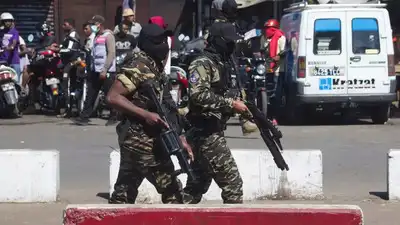The ongoing Madagascar Gen Z protests reached a boiling point on Sunday October 12, 2025, as elite soldiers from the CAPSAT unit mutinied and announced that they had seized control of key military assets.
The CAPSAT unit is also declaring its support for the Madagascar Gen Z protests against bad governance.
CAPSAT Colonel Michael Randrianirina said his unit’s decision to join the protesters did not amount to a coup. “We answered the people’s calls, but it wasn’t a coup d’état,” he told reporters.
However, Madagascar President Andry Rajoelina has swiftly kicked against the decision of the army unit, labelling the move an “illegal power grab,” sounding the alarm over a potential coup that threatens to upend his administration.
Pan-Atlantic Kompass reports that the development came after Madagascar Gen Z protests erupted in late September as a grassroots outcry against what many described as failing infrastructure.
The protests have swiftly morphed into the most formidable challenge to Rajoelina’s rule since his 2023 reelection.
What began as frustrated chants has now drawn in the military, echoing youth uprisings in Kenya and Nepal that inspired the island nation’s Gen Z organizers.
This is as the CAPSAT army unit siding with anti-government protesters in Madagascar has installed a new military chief.
The army unit installed General Demosthene Pikulas as chief of the Army Staff of Madagascar.
The installation occurred during a ceremony at the army headquarters attended by Armed Forces Minister Manantsoa Deramasinjaka Rakotoarivelo on Sunday.
“I give him my blessing,” the minister said of Pikulas, who was chosen by the mutinying CAPSAT unit that on Saturday had joined the youth-led demonstrators.
In his address after the installation, Pikulas admitted to journalists that events in Madagascar over the past few days had been “unpredictable”.
“So the army has a responsibility to restore calm and peace throughout Madagascar,” he said.
Asked about calls for Rajoelina to resign, he said he refused to “discuss politics within a military facility”.
Following the installation, the army unit in a viral video on Sunday, claimed that “from now on, all orders of the Malagasy army – whether land, air or [naval] – will originate from CAPSAT headquarters.”
“We have become boot lickers,” some members of the unit said in a video posted on social media. “We have chosen to submit and execute orders, even illegal ones, instead of protecting the population and their property.”
“Do not obey orders from your superiors. Point your weapons at those who order you to fire on your comrades in arms because they will not take care of our families if we die,” they said.
However, the 51-year-old Madagascar President, Rajoelina who first came to power as the leader of a transitional government, following a 2009 military-backed coup that forced then-President Marc Ravalomanana to flee the country, has rejected the move.
In a statement, Rajoelina’s office said he “wishes to inform the nation and the international community that an attempt to seize power illegally and by force” has been “initiated.”
“In view of the extreme gravity of this situation, the president’s office strongly condemns this attempt at destabilisation and calls upon all forces of the nation to unite in defence of constitutional order and national sovereignty.”
In a similar development, Madagascar’s Senate announced in a statement that Senate President General Richard Ravalomanana – a close ally of Rajoelina’s – had been removed from office, citing “the current political situation in Madagascar and in response to the Malagasy people’s aspirations for stability, justice, and transparent governance.”
Recall also that the development came after Rajoelina fired his government on 29 September in response to the Madagascar Gen Z protests.
Rajoelina also appealed to protesters to give him one year, pledging to step aside if his final effort to meet their expectations and regain public support fails.
However, Madagascar youths rejected the President’s decision, describing it as insufficient, calling for the resignation of the president, as well as the leader of parliament and constitutional court judges, while protesters on the streets continued to shout, “Miala Rajoelina!” (Leave Rajoelina!).
Many of the protesters have decried the fact that Madagascar is one of the world’s poorest countries, with a GDP per capita of just $545 last year, according to the World Bank.
The protesters also lamented against chronic water and electricity shortages.
“People don’t have refrigeration for medication, don’t have water for basic hygiene, and then there’s massive corruption,” Ketakandriana Rafitoson, the global vice chair of Transparency International, said.
Meanwhile, the United Nations has disclosed that at least 22 people have been killed and more than 100 injured since the Madagascar Gen Z protests erupted on September 25.
UN High Commissioner for Human Rights Volker Türk expressed shock at the alleged violent response by security forces to the ongoing protests in Madagascar.
Türk said: “I am shocked and saddened by the killings and injuries in the protests over water and power cuts in Madagascar.
“I urge the authorities to ensure respect for freedom of expression and peaceful assembly, consistent with their obligations under international human rights law.
“I urge the security forces to desist from the use of unnecessary and disproportionate force and to immediately release all arbitrarily detained protesters. International human rights law is particularly strict on the use of firearms; they can only be used by law enforcement officers when strictly necessary to protect life or prevent serious injury from an imminent threat.”





